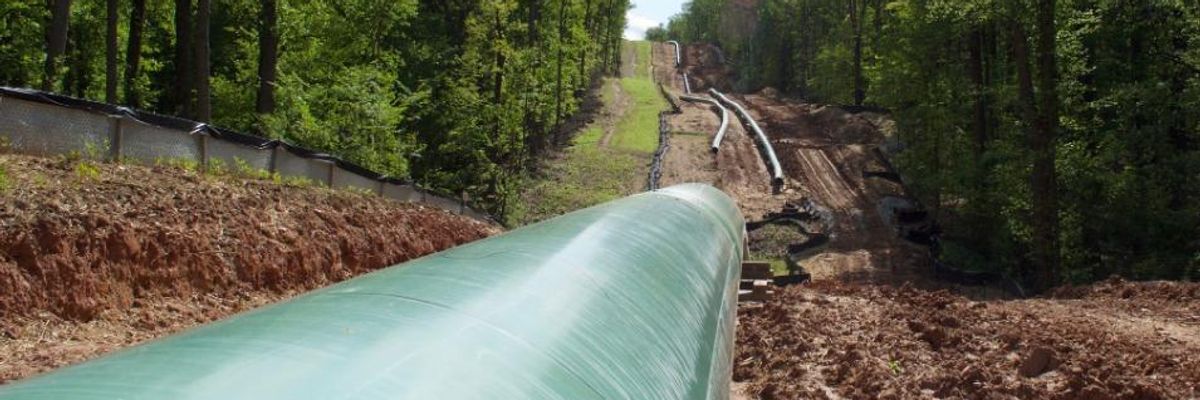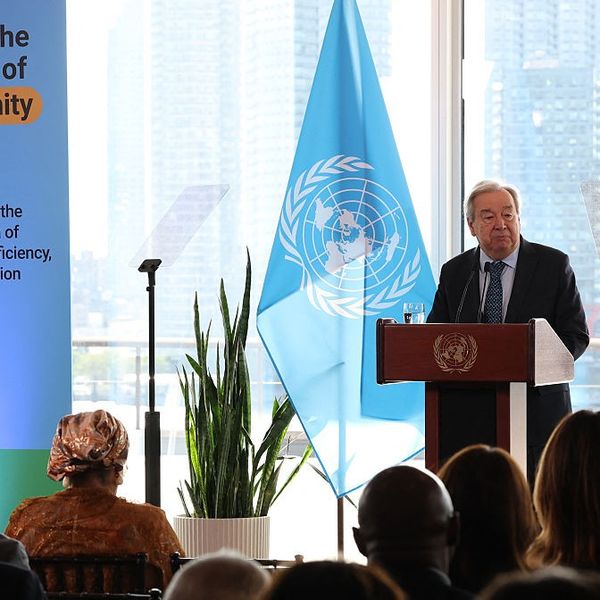
As Major Parties Embrace Fracking, Report Shows Natural Gas 'Bridge to Climate Disaster'
'Currently planned gas production expansion in Appalachia would make meeting U.S. climate goals impossible,' says Oil Change International
As the Democratic Party comes under fire for not taking a strong enough stance on fracking, and Donald Trump considers drilling tycoon Harold Hamm for Energy Secretary in his hypothetical cabinet, a new report out Friday details how proposed natural gas expansion in the U.S. stands to undermine national climate goals as well as public and environmental health.
A Bridge Too Far: How Appalachian Basin Gas Pipeline Expansion Will Undermine U.S. Climate Goals (pdf), fromOil Change International (OCI) in partnership with 11 other organizations, "shows that current projections for U.S. natural gas production--fueled by a boom in the Appalachian basin--will lock in enough carbon to bust through agreed climate goals," according to a press statement from OCI.
Echoing arguments made by environmentalist Bill McKibben and others, the report undercuts the specious argument that natural gas is a "bridge" fuel spanning the gap between dirty fossil fuels and clean renewable energy.
Indeed, said OCI executive director Stephen Kretzmann, "expanded natural gas production is a bridge to climate disaster. Our report shows that even if we entirely eliminated emissions from coal and oil, the emissions from the natural gas boom alone would still blow our climate budget. This should be a wake up call to anyone promoting natural gas as a bridge to a clean energy future. Put simply, it's not."
Specifically, the report highlights three conclusions:
- There are 19 key new proposed natural gas pipelines in the Appalachian basin. All of them are incompatible with the Paris target and existing U.S. climate goals;
- Stopping this new supply infrastructure is critical to the Keep It In the Ground movement's goals of stopping infrastructure that creates carbon lock-in; and
- All new energy projects must pass a climate test to prove their viability in a climate safe world. These new gas pipelines fail that test.
In fact, the report declares, "the currently planned gas production expansion in Appalachia would make meeting U.S. climate goals impossible...This makes it clear that the growing use of gas is out of sync with U.S. climate goals."
OCI and its partners stressed on Friday that renewable energy is "ready" to step in to replace dirty fuels.
"West Virginia's economy, environmental preservation, social justice issues and citizen well-being will be best served by shifting the focus to developing statewide renewable energy resource infrastructures," said Laurie Ardison, a member of the executive committee of the West Virginia Sierra Club.
"As one of the most susceptible states in the country to the devastating effects of sea-level rise, Virginia cannot afford to be locked into decades of more reliance on fossil fuels," added Anne Havemann, general counsel at the Chesapeake Climate Action Network, which is planning a climate rally this Saturday in front of Virginia Gov. Terry McAuliffe's mansion to call for "solar panels, not pipelines," among other demands.
Friday's analysis comes on the heels of another recent report showing that U.S. public lands and ocean regions already under lease for fossil fuel extraction will be producing coal, oil, and gas decades beyond the point at which scientists predict the world will surpass the temperature targets set out in the Paris climate agreement, as Common Dreams reported.
An Urgent Message From Our Co-Founder
Dear Common Dreams reader, The U.S. is on a fast track to authoritarianism like nothing I've ever seen. Meanwhile, corporate news outlets are utterly capitulating to Trump, twisting their coverage to avoid drawing his ire while lining up to stuff cash in his pockets. That's why I believe that Common Dreams is doing the best and most consequential reporting that we've ever done. Our small but mighty team is a progressive reporting powerhouse, covering the news every day that the corporate media never will. Our mission has always been simple: To inform. To inspire. And to ignite change for the common good. Now here's the key piece that I want all our readers to understand: None of this would be possible without your financial support. That's not just some fundraising cliche. It's the absolute and literal truth. We don't accept corporate advertising and never will. We don't have a paywall because we don't think people should be blocked from critical news based on their ability to pay. Everything we do is funded by the donations of readers like you. The final deadline for our crucial Summer Campaign fundraising drive is just days away, and we’re falling short of our must-hit goal. Will you donate now to help power the nonprofit, independent reporting of Common Dreams? Thank you for being a vital member of our community. Together, we can keep independent journalism alive when it’s needed most. - Craig Brown, Co-founder |
As the Democratic Party comes under fire for not taking a strong enough stance on fracking, and Donald Trump considers drilling tycoon Harold Hamm for Energy Secretary in his hypothetical cabinet, a new report out Friday details how proposed natural gas expansion in the U.S. stands to undermine national climate goals as well as public and environmental health.
A Bridge Too Far: How Appalachian Basin Gas Pipeline Expansion Will Undermine U.S. Climate Goals (pdf), fromOil Change International (OCI) in partnership with 11 other organizations, "shows that current projections for U.S. natural gas production--fueled by a boom in the Appalachian basin--will lock in enough carbon to bust through agreed climate goals," according to a press statement from OCI.
Echoing arguments made by environmentalist Bill McKibben and others, the report undercuts the specious argument that natural gas is a "bridge" fuel spanning the gap between dirty fossil fuels and clean renewable energy.
Indeed, said OCI executive director Stephen Kretzmann, "expanded natural gas production is a bridge to climate disaster. Our report shows that even if we entirely eliminated emissions from coal and oil, the emissions from the natural gas boom alone would still blow our climate budget. This should be a wake up call to anyone promoting natural gas as a bridge to a clean energy future. Put simply, it's not."
Specifically, the report highlights three conclusions:
- There are 19 key new proposed natural gas pipelines in the Appalachian basin. All of them are incompatible with the Paris target and existing U.S. climate goals;
- Stopping this new supply infrastructure is critical to the Keep It In the Ground movement's goals of stopping infrastructure that creates carbon lock-in; and
- All new energy projects must pass a climate test to prove their viability in a climate safe world. These new gas pipelines fail that test.
In fact, the report declares, "the currently planned gas production expansion in Appalachia would make meeting U.S. climate goals impossible...This makes it clear that the growing use of gas is out of sync with U.S. climate goals."
OCI and its partners stressed on Friday that renewable energy is "ready" to step in to replace dirty fuels.
"West Virginia's economy, environmental preservation, social justice issues and citizen well-being will be best served by shifting the focus to developing statewide renewable energy resource infrastructures," said Laurie Ardison, a member of the executive committee of the West Virginia Sierra Club.
"As one of the most susceptible states in the country to the devastating effects of sea-level rise, Virginia cannot afford to be locked into decades of more reliance on fossil fuels," added Anne Havemann, general counsel at the Chesapeake Climate Action Network, which is planning a climate rally this Saturday in front of Virginia Gov. Terry McAuliffe's mansion to call for "solar panels, not pipelines," among other demands.
Friday's analysis comes on the heels of another recent report showing that U.S. public lands and ocean regions already under lease for fossil fuel extraction will be producing coal, oil, and gas decades beyond the point at which scientists predict the world will surpass the temperature targets set out in the Paris climate agreement, as Common Dreams reported.
As the Democratic Party comes under fire for not taking a strong enough stance on fracking, and Donald Trump considers drilling tycoon Harold Hamm for Energy Secretary in his hypothetical cabinet, a new report out Friday details how proposed natural gas expansion in the U.S. stands to undermine national climate goals as well as public and environmental health.
A Bridge Too Far: How Appalachian Basin Gas Pipeline Expansion Will Undermine U.S. Climate Goals (pdf), fromOil Change International (OCI) in partnership with 11 other organizations, "shows that current projections for U.S. natural gas production--fueled by a boom in the Appalachian basin--will lock in enough carbon to bust through agreed climate goals," according to a press statement from OCI.
Echoing arguments made by environmentalist Bill McKibben and others, the report undercuts the specious argument that natural gas is a "bridge" fuel spanning the gap between dirty fossil fuels and clean renewable energy.
Indeed, said OCI executive director Stephen Kretzmann, "expanded natural gas production is a bridge to climate disaster. Our report shows that even if we entirely eliminated emissions from coal and oil, the emissions from the natural gas boom alone would still blow our climate budget. This should be a wake up call to anyone promoting natural gas as a bridge to a clean energy future. Put simply, it's not."
Specifically, the report highlights three conclusions:
- There are 19 key new proposed natural gas pipelines in the Appalachian basin. All of them are incompatible with the Paris target and existing U.S. climate goals;
- Stopping this new supply infrastructure is critical to the Keep It In the Ground movement's goals of stopping infrastructure that creates carbon lock-in; and
- All new energy projects must pass a climate test to prove their viability in a climate safe world. These new gas pipelines fail that test.
In fact, the report declares, "the currently planned gas production expansion in Appalachia would make meeting U.S. climate goals impossible...This makes it clear that the growing use of gas is out of sync with U.S. climate goals."
OCI and its partners stressed on Friday that renewable energy is "ready" to step in to replace dirty fuels.
"West Virginia's economy, environmental preservation, social justice issues and citizen well-being will be best served by shifting the focus to developing statewide renewable energy resource infrastructures," said Laurie Ardison, a member of the executive committee of the West Virginia Sierra Club.
"As one of the most susceptible states in the country to the devastating effects of sea-level rise, Virginia cannot afford to be locked into decades of more reliance on fossil fuels," added Anne Havemann, general counsel at the Chesapeake Climate Action Network, which is planning a climate rally this Saturday in front of Virginia Gov. Terry McAuliffe's mansion to call for "solar panels, not pipelines," among other demands.
Friday's analysis comes on the heels of another recent report showing that U.S. public lands and ocean regions already under lease for fossil fuel extraction will be producing coal, oil, and gas decades beyond the point at which scientists predict the world will surpass the temperature targets set out in the Paris climate agreement, as Common Dreams reported.

